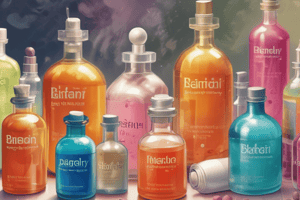Podcast
Questions and Answers
The component of a pesticide formulation that controls the pest is the ______ ingredient.
The component of a pesticide formulation that controls the pest is the ______ ingredient.
active
Careful pesticide selection is important because pesticide formulations vary in their safety to the user, environment, and crop to be treated; efficacy; and cost.
Careful pesticide selection is important because pesticide formulations vary in their safety to the user, environment, and crop to be treated; efficacy; and cost.
True (A)
Which of the following is not a concern when handling an emulsified concentrate pesticide?
Which of the following is not a concern when handling an emulsified concentrate pesticide?
clogged nozzles and screens
Which of the following formulations dissolve in water?
Which of the following formulations dissolve in water?
Breathing in dust is a potential hazard associated with the mixing of wettable powders and soluble powders.
Breathing in dust is a potential hazard associated with the mixing of wettable powders and soluble powders.
Which of the following pesticide formulations must be mixed with water before being used by the applicator?
Which of the following pesticide formulations must be mixed with water before being used by the applicator?
When added to water, emulsifiable concentrates form emulsions.
When added to water, emulsifiable concentrates form emulsions.
Most bait formulations have 50 percent or more active ingredient.
Most bait formulations have 50 percent or more active ingredient.
Extreme care must be exercised when placing baits to make them inaccessible to children, pets, and other nontarget species.
Extreme care must be exercised when placing baits to make them inaccessible to children, pets, and other nontarget species.
All pesticide manufacturers include all the necessary adjuvants, thus you do not need to add them when mixing a spray tank load.
All pesticide manufacturers include all the necessary adjuvants, thus you do not need to add them when mixing a spray tank load.
Which of the following is a true statement about fumigant formulations?
Which of the following is a true statement about fumigant formulations?
Two or more pesticides that cannot be effectively mixed together are said to be ______.
Two or more pesticides that cannot be effectively mixed together are said to be ______.
When adding two or more pesticides into a spray tank, always add the liquid formulations first.
When adding two or more pesticides into a spray tank, always add the liquid formulations first.
Adjuvants are often required when making applications to leaves that are ______ or ______.
Adjuvants are often required when making applications to leaves that are ______ or ______.
Adjuvants can be added to any pesticide spray mixture.
Adjuvants can be added to any pesticide spray mixture.
Flashcards are hidden until you start studying
Study Notes
Pesticide Formulations and Handling
- The active ingredient in a pesticide formulation is essential for pest control.
- Pesticide formulations differ in safety, efficacy, environmental impact, and cost, making careful selection crucial.
- Clogged nozzles and screens are not a primary concern when handling emulsified concentrate pesticides.
- Soluble powders are among the formulations that can dissolve in water.
- Mixing wettable powders and soluble powders poses a risk of inhaling dust.
Application and Mixing Guidelines
- Flowable pesticide formulations must be mixed with water prior to application.
- Emulsifiable concentrates create emulsions when mixed with water, enhancing effectiveness.
- Most bait formulations contain less than 50 percent active ingredient.
- Baits must be placed with extreme caution to prevent access by children, pets, or other non-target species.
- Pesticide manufacturers may not include all necessary adjuvants, often requiring additional mixing.
Fumigants and Pesticide Compatibility
- Fumigants are highly regulated, used in soil, enclosed structures, and containers, targeting a wide range of pests and posing significant hazards.
- Pesticides that cannot be effectively mixed are referred to as incompatible.
- When mixing pesticides, begin with solid formulations rather than liquid ones.
- Adjuvants are necessary for applications on waxy or hairy leaves for better adhesion and efficacy.
- Not all pesticide spray mixtures can include adjuvants; some formulations may not require them.
Studying That Suits You
Use AI to generate personalized quizzes and flashcards to suit your learning preferences.




